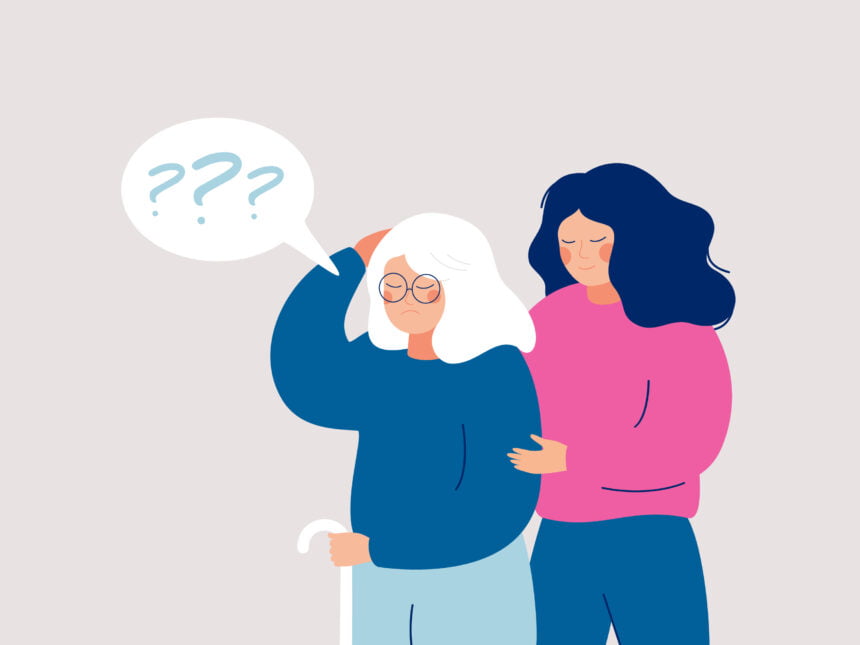Caring for a family member who has dementia or dementia related disorder can be physically and emotionally draining. While you may be able to manage their care all on your own, there will come a time when you can’t. At that stage, you may want to consider hospice or nurse care.
What is Dementia?
Dementia is an umbrella term and/or syndrome that describes a group of symptoms that don’t have a definitive diagnosis. It’s common for people to mistake dementia for Alzheimer’s disease, but they aren’t the same. However, Alzheimer’s is responsible for 60% to 80% of dementia cases.
When to Seek Professional Support for Dementia Care
There are several different types of dementia, each of which progresses at different rates. To determine when you should switch to hospice care, let’s examine the stages of dementia.
Early-Stage Dementia
In the early stage of dementia, most people aren’t aware they have it, so your relative has likely progressed beyond this point. Early-stage symptoms include forgetfulness, limited attention span, difficulty concentrating, mood shifts, depression, and mild coordination problems.
You can maximize your relative’s independence by helping them with:
- Keeping appointments
- Remembering names and words
- Recalling familiar people or places
- Managing money
- Organizing and planning
- Keeping track of medication
- Transportation
If your relative is currently in this stage, try to take care of yourself. You’ll experience a lot of ups and downs with your mental state, so it’s essential to take a break when you need it.
Middle Stage Dementia
In the middle stage, your family member may need help living on their own, but not so much support that you have to be present 24/7. You’ll need to assist them with daily tasks.
This may be the first time you’ve looked up hospice criteria for Dementia, but most companies will take dementia patients when they’re in the end-of-life stage. You may also consider moving your relative into a long-term care home or asking for additional support from your family.
Middle stage dementia can bring forth more challenges, but you can help by:
- Speaking to a doctor about available treatment options
- Paying attention to your relative’s daily health (physical and mental)
- Adapting the same care strategies from the early stage
Your loved one may be in denial, scared, stressed, angry, or depressed more often at this stage. If that’s the case, encourage the person to share their feelings in a journal and spend time doing activities they enjoy. Start attending patient support groups if you haven’t been doing so already.
Late-Stage Dementia
At the late stage, you’ll have to seriously consider hiring a nurse or putting your relative into a long-term care home or hospice care, as it will get increasingly harder to care for them yourself.
The moment you notice your relative speaking incoherently or forgetting to eat, exercise or bathe, contact a medical professional for your next steps. Your relative may not be able to communicate to you that they’re experiencing difficulties, so you’ll have to take charge here.
People with late stage dementia will experience the following:
- Severe impairments in memory and recognizing time and places
- Losing the capacity to communicate effectively or speak entirely
- The inability to go to the bathroom, eat, or walk by themselves
By the late stage, 24-hour care is essential, even if your relative protests. While it’s difficult to go against your relative’s wishes, it’s more important that they’re safe and cared for at all times.
End-of-Life Dementia
If your relative isn’t in hospice care or a long-term care home, you should move them into one of these facilities immediately. Unfortunately, many of the conditions that relate to dementia are terminal, so your relative’s mental and physical health will continue to get worse until they pass.
When the patient is nearing death, the most important thing to do is focus on their comfort and palliative care. Symptom management, pain relief, and quality of life will start to take precedent.
As with the early stage, take some time to pay attention to your own needs. You may feel isolated, depressed, and struggling with grief or loss. Speak to support groups that help family members who care for dementia patients and consult a mental health professional if needed.

